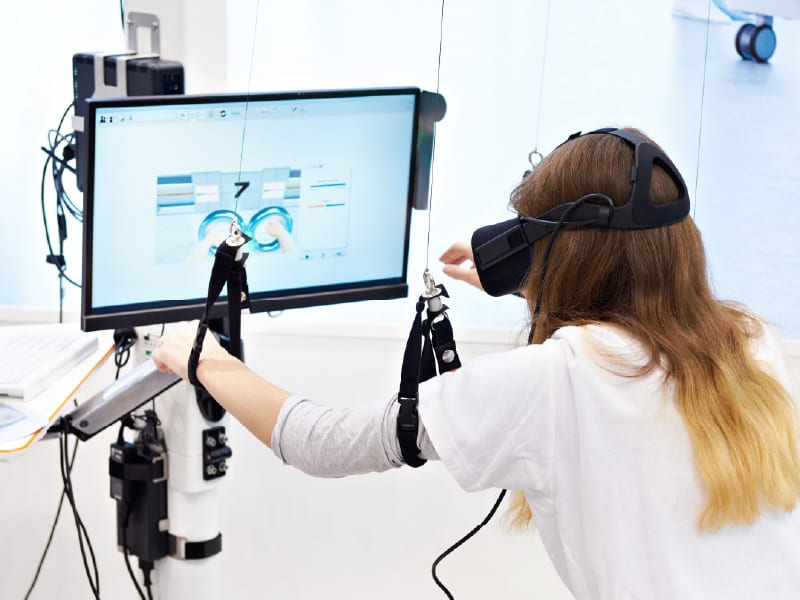Addiction treatment is constantly evolving, and one of the most exciting developments is the use of virtual reality therapy. This innovative approach combines technology with therapy to create immersive, effective addiction treatment experiences.
What is Virtual Reality Therapy?
Virtual reality therapy uses VR technology to create simulated environments where you can safely explore and confront challenges related to addiction. These environments are designed to mimic real-life situations that might trigger substance use, allowing you to practice coping strategies in a controlled setting.
How VR Therapy Works
In VR therapy, you wear a VR headset that immerses you in a 3D environment. This environment can be anything from a bar to a stressful work situation. The therapist guides you through these scenarios, helping you develop new skills to handle triggers and cravings.
Benefits of VR Therapy in Addiction Treatment
VR therapy offers several unique benefits that can enhance traditional addiction treatment methods.
Safe Exposure to Triggers
One of the biggest challenges in addiction treatment is learning to cope with triggers. VR therapy allows you to face these triggers in a safe, controlled environment. You can practice your coping skills without the risk of relapse.
Enhanced Engagement
VR is immersive and engaging. This can make therapy sessions more interesting and interactive. When you’re fully engaged, you’re more likely to stay focused and committed to your treatment.
Personalized Scenarios
VR therapy can be tailored to your specific needs. The therapist can create scenarios that reflect your personal triggers and challenges. This personalized approach makes the therapy more relevant and effective.
Combining VR with Traditional Therapies
VR therapy is most effective when combined with traditional therapies like Cognitive Behavioral Therapy (CBT). The VR environment allows you to practice the skills you learn in CBT in real-time, reinforcing the lessons and strategies.
The Role of the Therapist
The therapist plays a crucial role in VR therapy. They guide you through the VR scenarios, helping you understand and manage your reactions. They also provide support and feedback, helping you refine your coping strategies.
Overcoming Barriers to VR Therapy
VR therapy can help overcome some common barriers to addiction treatment.
Accessibility
For people who have difficulty attending in-person therapy sessions, VR therapy can be a more accessible option. It can be done from home, reducing the need for travel.
Anonymity
Some people feel uncomfortable attending traditional therapy sessions due to stigma or privacy concerns. VR therapy can offer a higher level of anonymity, making it easier for these individuals to seek help.
VR therapy can be a game-changer in addiction treatment. I’ve seen how it helps people engage more deeply in their treatment and practice their skills in a realistic yet safe environment. It’s amazing to see the progress people can make with this innovative approach.
Challenges of VR Therapy
While VR therapy offers many benefits, it’s not without its challenges.
Cost
VR equipment can be expensive, which might make this therapy less accessible for some people. However, as technology advances, the cost is expected to decrease.
Technology Limitations
Not everyone is comfortable with technology. Some people might find the VR experience disorienting or overwhelming. It’s important to assess your comfort level with technology before starting VR therapy.
Finding a VR Therapy Program
If you’re interested in VR therapy, look for treatment centers that offer this innovative approach. Talk to your healthcare provider about whether VR therapy might be a good fit for you. They can help you find a program that meets your needs.
Virtual reality therapy is an exciting development in the field of addiction treatment. By combining immersive technology with traditional therapy techniques, VR therapy offers a new way to practice coping skills and manage triggers.
Innovative approaches like virtual reality therapy are changing the landscape of addiction treatment. VR therapy provides a safe, engaging, and personalized way to confront and manage triggers. When combined with traditional therapies, it can enhance your overall treatment plan. If you’re looking for a new way to support your recovery, consider exploring virtual reality therapy. With the right support and tools, you can achieve lasting recovery


